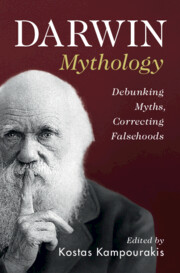Book contents
- Darwin Mythology
- Darwin Mythology
- Copyright page
- Dedication
- Contents
- Figures
- Contributors
- Acknowledgments
- Introduction: Myths and Darwin
- Myth 1 That Myths Are Simple Falsehoods
- Myth 2 That Most European Naturalists Before Darwin Did Not Think That Species Change Was Possible
- Myth 3 That Charles Darwin Was Not Directly Influenced by the Evolutionary Views of His Grandfather Erasmus
- Myth 4 That Darwin Always Rejected the Argument from Design in Nature and Developed His Own Theory to Replace It
- Myth 5 That Darwin Converted to Evolutionary Theory During His Historic Galápagos Islands Visit
- Myth 6 That Darwin’s Galápagos Finches Inspired His Most Important Evolutionary Insights
- Myth 7 That Darwin Was a Recluse, and a Theoretician Rather Than a Practical Scientist
- Myth 8 That Darwin Rejected Lamarck’s Ideas of Use and Disuse and of the Inheritance of Acquired Traits
- Myth 9 That Darwin’s Theory Was Essentially Complete Once He Came Up with the Idea of Natural Selection
- Myth 10 That Darwin Delayed the Publication of His Theory for Twenty Years, Being Afraid of the Reactions It Would Cause
- Myth 11 That Wallace’s and Darwin’s Theories Were the Same, and That Darwin Did Not Reveal Wallace’s 1858 Letter and Theory Until He Ensured His Own Priority
- Myth 12 That Huxley Was Darwin’s Bulldog and Accepted All Aspects of His Theory
- Myth 13 That Huxley Defeated Wilberforce, and Ridiculed His Obscurantism, in the 1860 Oxford Debate
- Myth 14 That Darwin’s Critics Such as Owen Were Prejudiced and Had No Scientific Arguments
- Myth 15 That Natural Selection Can Also Be Accurately Described As the Survival of the Fittest
- Myth 16 That Darwin Banished Teleology from Biology
- Myth 17 That Darwin’s Success Depended on Undermining “Aristotelian Essentialism”
- Myth 18 That Darwin’s Theory Would Have Become More Widely Accepted Immediately Had He Read Mendel’s 1866 Paper
- Myth 19 That Darwin Faced a Conspiracy of Silence in Lamarck’s Country
- Myth 20 That Hitler Endorsed and Was Influenced by Darwin’s Theory
- Myth 21 That Sexual Selection Was Darwin’s Afterthought to Natural Selection
- Myth 22 That Darwin’s Hatred of Slavery Reflected His Beliefs in Racial Equality
- Myth 23 That the Discovery of Australopithecus in 1925 Belatedly Confirmed Darwin’s 1871 Scientific Prediction of African Human Origins
- Myth 24 That Darwin’s Theory Brought an Instant and Immediate Revolution in the Life Sciences
- Conclusion: What Inferences About Science Can We Draw from Charles Darwin’s Life and Work?
- Further Reading
- Index
Conclusion: What Inferences About Science Can We Draw from Charles Darwin’s Life and Work?
Published online by Cambridge University Press: 30 May 2024
- Darwin Mythology
- Darwin Mythology
- Copyright page
- Dedication
- Contents
- Figures
- Contributors
- Acknowledgments
- Introduction: Myths and Darwin
- Myth 1 That Myths Are Simple Falsehoods
- Myth 2 That Most European Naturalists Before Darwin Did Not Think That Species Change Was Possible
- Myth 3 That Charles Darwin Was Not Directly Influenced by the Evolutionary Views of His Grandfather Erasmus
- Myth 4 That Darwin Always Rejected the Argument from Design in Nature and Developed His Own Theory to Replace It
- Myth 5 That Darwin Converted to Evolutionary Theory During His Historic Galápagos Islands Visit
- Myth 6 That Darwin’s Galápagos Finches Inspired His Most Important Evolutionary Insights
- Myth 7 That Darwin Was a Recluse, and a Theoretician Rather Than a Practical Scientist
- Myth 8 That Darwin Rejected Lamarck’s Ideas of Use and Disuse and of the Inheritance of Acquired Traits
- Myth 9 That Darwin’s Theory Was Essentially Complete Once He Came Up with the Idea of Natural Selection
- Myth 10 That Darwin Delayed the Publication of His Theory for Twenty Years, Being Afraid of the Reactions It Would Cause
- Myth 11 That Wallace’s and Darwin’s Theories Were the Same, and That Darwin Did Not Reveal Wallace’s 1858 Letter and Theory Until He Ensured His Own Priority
- Myth 12 That Huxley Was Darwin’s Bulldog and Accepted All Aspects of His Theory
- Myth 13 That Huxley Defeated Wilberforce, and Ridiculed His Obscurantism, in the 1860 Oxford Debate
- Myth 14 That Darwin’s Critics Such as Owen Were Prejudiced and Had No Scientific Arguments
- Myth 15 That Natural Selection Can Also Be Accurately Described As the Survival of the Fittest
- Myth 16 That Darwin Banished Teleology from Biology
- Myth 17 That Darwin’s Success Depended on Undermining “Aristotelian Essentialism”
- Myth 18 That Darwin’s Theory Would Have Become More Widely Accepted Immediately Had He Read Mendel’s 1866 Paper
- Myth 19 That Darwin Faced a Conspiracy of Silence in Lamarck’s Country
- Myth 20 That Hitler Endorsed and Was Influenced by Darwin’s Theory
- Myth 21 That Sexual Selection Was Darwin’s Afterthought to Natural Selection
- Myth 22 That Darwin’s Hatred of Slavery Reflected His Beliefs in Racial Equality
- Myth 23 That the Discovery of Australopithecus in 1925 Belatedly Confirmed Darwin’s 1871 Scientific Prediction of African Human Origins
- Myth 24 That Darwin’s Theory Brought an Instant and Immediate Revolution in the Life Sciences
- Conclusion: What Inferences About Science Can We Draw from Charles Darwin’s Life and Work?
- Further Reading
- Index
Summary
In this concluding chapter, I draw conclusions about several important aspects of nature of science by drawing on the topics discussed in the various chapters of the book. Such conclusions include: that individual brilliance and creativity can make a difference; the historical milieu of the individual is equally crucial; that scientists are humans with weaknesses and concerns like all of us; and that gender may influence one’s opportunities to contribute to science.
- Type
- Chapter
- Information
- Darwin MythologyDebunking Myths, Correcting Falsehoods, pp. 286 - 300Publisher: Cambridge University PressPrint publication year: 2024

